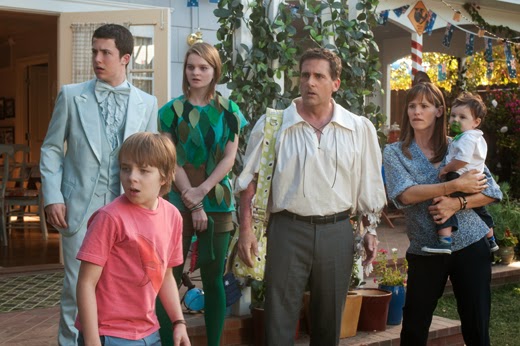This isn’t a movie; it’s a string of crude and violent blackout sketches laced with relentless profanity and vulgar one-liners, loosely stitched to a so-called plot that’s dog-nuts even by superhero movie standards.
 |
| Having penetrated the Big Bad's weird lair in this aggressively deranged flick, Wolverine (Hugh Jackman, left) and Deadpool (Ryan Reynolds) realize that they may be in over their heads... |
Let’s call it a triumph of crass commercialism, while acknowledging that mainstream viewers — and even fans of the “conventional” Marvel superhero films — are advised to steer very, very clear.
This gleefully atrocious burlesque wears “Tasteless” like a badge of honor. But if the wretched excess is removed — to quote Gertrude Stein — there is no there there. After the introductory title credits orgy of slashed throats, impalements, severed limbs, decapitations, gouts of blood, and relentless F-bombs, the realization that the entire film will continue in this manner, isn’t merely disheartening.
It’s boring. Truly.
The primary running joke concerns the constant squabbling and fighting between Deadpool and Wolverine, because — since both have regenerative powers — neither can be killed. Cue all manner of shooting, stabbing and bone-breaking mayhem.
Mildly funny the first time. Not on constant repeat.
Director Shawn Levy and his four co-scripters deserve mild credit for archly breaking the fourth wall and elevating meta to new heights, with foul-mouthed Deadpool (Ryan Reynolds) taking cheeky real-world jabs at Disney, 20th Century Fox and all manner of pop-culture entities. It’s like a Simpsons episode on speed, and when the snarky asides and Easter Eggs arrive with such rat-a-tat intensity, some of them are bound to land. And yes, a few do.
But that’s pretty thin gruel, given the vehicle driving this nonsense.
So: The “plot,” such as it is. Fasten your seatbelts; it’s gonna be a bumpy ride.
Wade Wilson, aka Deadpool, has been trying to go straight — as a car salesman — since his previous adventures in 2018’s Deadpool 2. This effort goes awry when he’s snatched from his life on Earth 10005 by Mr. Paradox (Matthew Macfadyen), a bureaucratic agent of the Time Variance Authority (TVA), responsible for monitoring all temporal law in the Marvel Comics Universe.
(Yes, this is a multiverse mash-up.)










